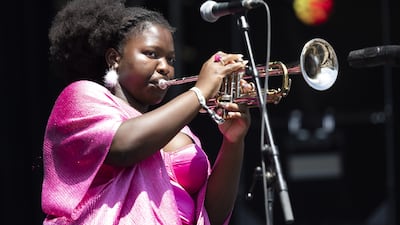Kokoroko are picking up where they left off.
Formed in 2014, the London collective built a formidable name in the UK and Europe with their fluent and energetic melding of jazz and African funk genres from Nigerian Afrobeat to Ghanaian Highlife.
After slaying festival audiences across the continent, the group released an eponymous 2019 EP that amassed more than 68 million streams on major music platforms.
Could%20We%20Be%20More
%3Cp%3EArtist%3A%20Kokoroko%3Cbr%3ELabel%3A%20Brownswood%20Recordings%3Cbr%3ERating%3A%203.5%2F5%3C%2Fp%3E%0A
The momentum only increased the anticipation surrounding debut album Could We Be More and, fortunately, for the most part, the group fulfilled its promise.
Led by trumpeter Sheila Maurice-Grey, the octet conjures up a vibrant 15-song set that harvests various influences from London to Lagos.
A sinewy Afrobeat groove carries Adwa, a strident piece punctured by the occasional thrilling horn explosion from saxophonist Cassie Kinoshi.
Tojo is a lovely marriage of past and future. The latter is supplied by Yohan Kebede's psychedelic keyboard riffs while the horn section, led by Maurice-Grey, delivers the kind of vintage arrangement recalling Fela Kuti.
Age of Ascent lives up to its esoteric title and finds the group slowing things down for a track cinematic in scope, while Eva Inu is a showcase for the group's lethal rhythm section of bassist Duane Atherley and drummer Ayo Salawu.
While largely instrumental, Could We Be More has a few vocal tracks.
The standout, Those Good Times, features a silky vocal by Maurice-Grey that takes the music towards neo-soul territory and provides an intriguing prospect on what direction Kokoroko can go next.
The smooth track also reveals the slight and niggling weakness running throughout Could We Be More, in that it can feel overproduced and doesn’t fully summon the energy of their pulsating live show.
This is best exemplified in War Dance, which despite its intention to be a rhythmic and sweaty number, seems too sanitised and polished to elicit the kind of primal dancing response seen when people see Kokoroko live.
That said, these are relatively minor gripes in what is a supremely assured debut album.
The specs
Engine: 8.0-litre, quad-turbo 16-cylinder
Transmission: 7-speed auto
0-100kmh 2.3 seconds
0-200kmh 5.5 seconds
0-300kmh 11.6 seconds
Power: 1500hp
Torque: 1600Nm
Price: Dh13,400,000
On sale: now
Sri Lanka-India Test series schedule
- 1st Test India won by 304 runs at Galle
- 2nd Test Thursday-Monday at Colombo
- 3rd Test August 12-16 at Pallekele
SPECS
Nissan 370z Nismo
Engine: 3.7-litre V6
Transmission: seven-speed automatic
Power: 363hp
Torque: 560Nm
Price: Dh184,500
UAE currency: the story behind the money in your pockets
The Equaliser 2
Director Antoine Fuqua
Starring: Denzel Washington, Bill Pullman, Melissa Leo, Ashton Sanders
Three stars
Global state-owned investor ranking by size
|
1.
|
United States
|
|
2.
|
China
|
|
3.
|
UAE
|
|
4.
|
Japan
|
|
5
|
Norway
|
|
6.
|
Canada
|
|
7.
|
Singapore
|
|
8.
|
Australia
|
|
9.
|
Saudi Arabia
|
|
10.
|
South Korea
|
How to help
Call the hotline on 0502955999 or send "thenational" to the following numbers:
2289 - Dh10
2252 - Dh50
6025 - Dh20
6027 - Dh100
6026 - Dh200
White hydrogen: Naturally occurring hydrogen
Chromite: Hard, metallic mineral containing iron oxide and chromium oxide
Ultramafic rocks: Dark-coloured rocks rich in magnesium or iron with very low silica content
Ophiolite: A section of the earth’s crust, which is oceanic in nature that has since been uplifted and exposed on land
Olivine: A commonly occurring magnesium iron silicate mineral that derives its name for its olive-green yellow-green colour
UAE currency: the story behind the money in your pockets
SPEC%20SHEET
%3Cp%3E%3Cstrong%3EProcessor%3A%3C%2Fstrong%3E%20Apple%20M2%2C%208-core%20CPU%2C%20up%20to%2010-core%20CPU%2C%2016-core%20Neural%20Engine%3C%2Fp%3E%0A%3Cp%3E%3Cstrong%3EDisplay%3A%3C%2Fstrong%3E%2013.6-inch%20Liquid%20Retina%2C%202560%20x%201664%2C%20224ppi%2C%20500%20nits%2C%20True%20Tone%2C%20wide%20colour%3C%2Fp%3E%0A%3Cp%3E%3Cstrong%3EMemory%3A%3C%2Fstrong%3E%208%2F16%2F24GB%3C%2Fp%3E%0A%3Cp%3E%3Cstrong%3EStorage%3A%3C%2Fstrong%3E%20256%2F512GB%20%2F%201%2F2TB%3C%2Fp%3E%0A%3Cp%3E%3Cstrong%3EI%2FO%3A%3C%2Fstrong%3E%20Thunderbolt%203%20(2)%2C%203.5mm%20audio%2C%20Touch%20ID%3C%2Fp%3E%0A%3Cp%3E%3Cstrong%3EConnectivity%3A%3C%2Fstrong%3E%20Wi-Fi%206%2C%20Bluetooth%205.0%3C%2Fp%3E%0A%3Cp%3E%3Cstrong%3EBattery%3A%3C%2Fstrong%3E%2052.6Wh%20lithium-polymer%2C%20up%20to%2018%20hours%2C%20MagSafe%20charging%3C%2Fp%3E%0A%3Cp%3E%3Cstrong%3ECamera%3A%3C%2Fstrong%3E%201080p%20FaceTime%20HD%3C%2Fp%3E%0A%3Cp%3E%3Cstrong%3EVideo%3A%3C%2Fstrong%3E%20Support%20for%20Apple%20ProRes%2C%20HDR%20with%20Dolby%20Vision%2C%20HDR10%3C%2Fp%3E%0A%3Cp%3E%3Cstrong%3EAudio%3A%3C%2Fstrong%3E%204-speaker%20system%2C%20wide%20stereo%2C%20support%20for%20Dolby%20Atmos%2C%20Spatial%20Audio%20and%20dynamic%20head%20tracking%20(with%20AirPods)%3C%2Fp%3E%0A%3Cp%3E%3Cstrong%3EColours%3A%3C%2Fstrong%3E%20Silver%2C%20space%20grey%2C%20starlight%2C%20midnight%3C%2Fp%3E%0A%3Cp%3E%3Cstrong%3EIn%20the%20box%3A%3C%2Fstrong%3E%20MacBook%20Air%2C%2030W%20or%2035W%20dual-port%20power%20adapter%2C%20USB-C-to-MagSafe%20cable%3C%2Fp%3E%0A%3Cp%3E%3Cstrong%3EPrice%3A%3C%2Fstrong%3E%20From%20Dh4%2C999%3C%2Fp%3E%0A
The Travel Diaries of Albert Einstein The Far East, Palestine, and Spain, 1922 – 1923
Editor Ze’ev Rosenkranz
Princeton
Islamophobia definition
A widely accepted definition was made by the All Party Parliamentary Group on British Muslims in 2019: “Islamophobia is rooted in racism and is a type of racism that targets expressions of Muslimness or perceived Muslimness.” It further defines it as “inciting hatred or violence against Muslims”.
PROFILE OF SWVL
Started: April 2017
Founders: Mostafa Kandil, Ahmed Sabbah and Mahmoud Nouh
Based: Cairo, Egypt
Sector: transport
Size: 450 employees
Investment: approximately $80 million
Investors include: Dubai’s Beco Capital, US’s Endeavor Catalyst, China’s MSA, Egypt’s Sawari Ventures, Sweden’s Vostok New Ventures, Property Finder CEO Michael Lahyani
Could%20We%20Be%20More
%3Cp%3EArtist%3A%20Kokoroko%3Cbr%3ELabel%3A%20Brownswood%20Recordings%3Cbr%3ERating%3A%203.5%2F5%3C%2Fp%3E%0A


